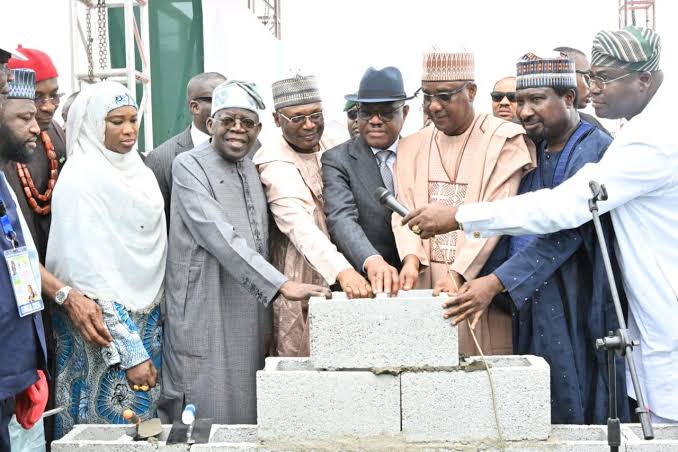/ News
Views: 756
New INEC complex breaks ground in Abuja as critics cite public spending concerns

President Bola Ahmed Tinubu has officially launched the construction of a new annex office complex for the Independent National Electoral Commission (INEC) in Abuja, a move hailed by the commission but met with concern from sections of the public.
The groundbreaking ceremony, held on Tuesday, was attended by INEC Chairman, Professor Mahmood Yakubu, who described the project as a significant milestone for the commission. He commended President Tinubu for personally gracing the occasion, noting that the new annex would help address long-standing infrastructural constraints at the commission’s current headquarters.
“Our present national headquarters, commissioned in December 1997, is severely congested,” Yakubu said. “Today, there are 13 full-time commission members, 22 departments and directorates, and over 1,000 staff. Every facility is overstretched from offices to meeting rooms.”
According to Yakubu, INEC has resorted to renting two separate buildings in Wuse Zone II, Abuja, to accommodate staff and host stakeholder engagements, a temporary measure that has become increasingly unsustainable. The new annex is expected to bring INEC operations under a single administrative roof, streamlining workflow and boosting efficiency.
Designed as a modern facility, the annex will feature office spaces, conference and meeting rooms, a 1,000-seat auditorium, and a state-of-the-art Election Monitoring and Support Centre (EMSC). It will also house a museum showcasing Nigeria’s electoral history, which Yakubu said would benefit students and researchers visiting the commission.
“This will offer citizens, particularly students who regularly visit the commission on excursions, an opportunity to appreciate the evolution of our electoral history,” he added.
Yakubu revealed that the project had been in planning for nearly ten years, making Tuesday’s groundbreaking a personal and institutional achievement.
However, the project has sparked criticism from civil society organisations and some public commentators who question the administration’s priorities. With widespread complaints about under-resourced healthcare, public education, and rising insecurity in the Federal Capital Territory, critics argue that government spending should be directed at basic public services.
Some observers have also raised concerns about the broader optics of constructing high-end facilities for institutions such as INEC, the judiciary, and the Office of the Vice President, particularly at a time when public trust in government institutions remains fragile. Activists warn that such initiatives risk being interpreted as efforts to consolidate power rather than promote service delivery.
Despite the controversy, the INEC leadership maintains that the new annex is essential for the commission to fulfil its growing responsibilities as Nigeria’s electoral processes continue to evolve.